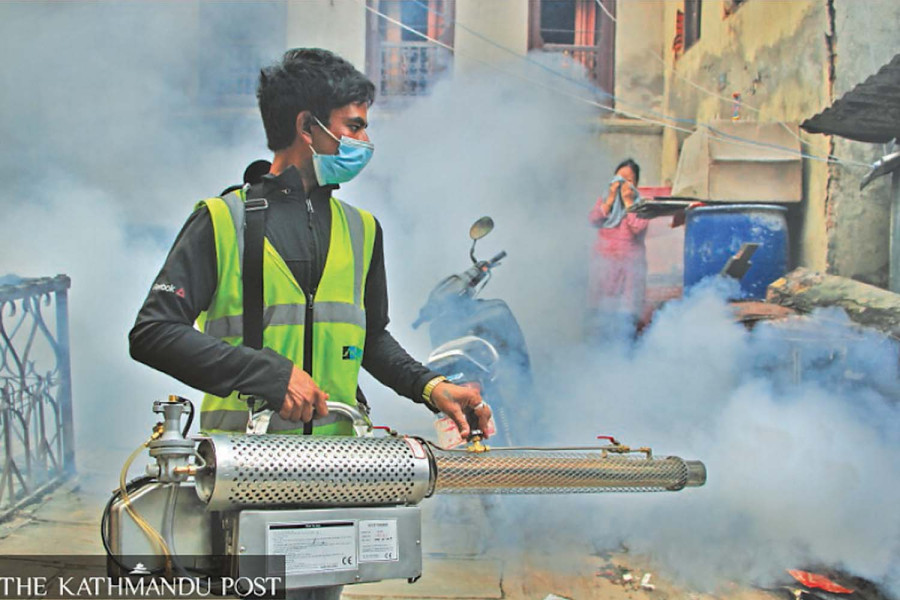Health
Winter no check for dengue infections. Health authorities mull multi-year action plan
More than 2,000 people were infected with the deadly virus in the past two months.
Post Report
Health officials had anticipated a slowdown in dengue virus spread in winter months but infections remained high even in the cold period, infecting hundreds of people across districts.
Data from the Epidemiology and Disease Control Division show that at least 1,323 people were infected with the virus in Poush (December 16 to January 13) and 853 in Magh (January 14 to February 12). Of the total cases, 151 needed hospitalisation and six had severe infections. One person succumbed to the complications arising from the infection in the period.
Officials note that the number of infections in January may be higher, as there have been issues with the health ministry’s reporting and recording system.
“Infection of dengue virus has not stopped in any month for the last several years,” said Dr Yadu Chandra Ghimire, director at the division.
The number of positive cases has declined comparatively, but case transmission continues in winter, he added.
Dengue is a mosquito-borne disease transmitted by the female Aedes aegypti and Aedes albopictus mosquitoes. The same vector also transmits chikungunya, yellow fever, and Zika, according to the World Health Organisation.
At least 15 died, and 41,865 others were infected by the deadly virus in 2024.
The virus has spread in 76 districts across the country. Experts say reported cases may only represent a small fraction of the true scale of the dengue outbreak, as around 90 percent of the infected people do not show any symptoms and health authorities often underreport deaths and infections.
Many people infected with dengue show mild symptoms, which do not need any treatment or can be managed with paracetamol at home.
As there is no specific treatment for dengue, health workers provide symptomatic care, including platelet-rich plasma transfusion.
According to experts, dengue became endemic in Nepal years ago, meaning that people get infected throughout the year. Minimum temperature dropped to less than five degrees Celsius in many places during winter. It was considered that dengue-spreading mosquitoes do not get active when the temperature declines below 15 degrees Celsius. However, the continuous spread of the virus in the chilling months raises questions about such assumptions.
Despite that, thousands of people get infected and hospitalised, and several die every year from the viral infection; relevant health authorities became active only when many people started to get hospitalised.
“We have been preparing a multi-year action plan to prevent dengue spread,” said Dr Gokarna Dahal, chief of the Vector Control Section at the division. “The action plan defines the work to be carried out by the three tiers of government—federal, provincial and local levels.”
Entomologists say that even if dengue spread slows naturally in the winter, the risk of infection with the deadly virus does not lessen, as the daytime maximum temperature suits virus-spreading vectors to get active.
As the temperature has risen, they warn that new cases will surge in the coming days.
“The spread of the dengue virus will not lessen without effective measures enforced,” said Sishir Panta, an entomologist. “Experiences from previous outbreaks must be taken into account while making action plans. We must work for a behavioural change in the general public, and awareness plays an important role.”
Dengue-transmitting mosquitoes breed in clean water and bite people in daylight. Uncovered water tanks and discarded objects such as plastic cups and bottles could be breeding grounds for dengue-carrying mosquitoes.
According to doctors, mild to high fever, severe muscle pain, rashes, severe headache and pain in the eyes are some symptoms of dengue. Doctors advise those with these symptoms to seek immediate treatment. While there is no specific cure for the disease, early detection and access to proper medical care can lower fatalities.
Nepal reported its first dengue case in a foreigner in 2004 in Chitwan district. Since then, an increasing number of dengue infections, including major outbreaks, have been reported from many districts.
The World Health Organisation says there is no specific cure for severe dengue, but early detection and access to proper medical care can save lives.




 25.96°C Kathmandu
25.96°C Kathmandu














